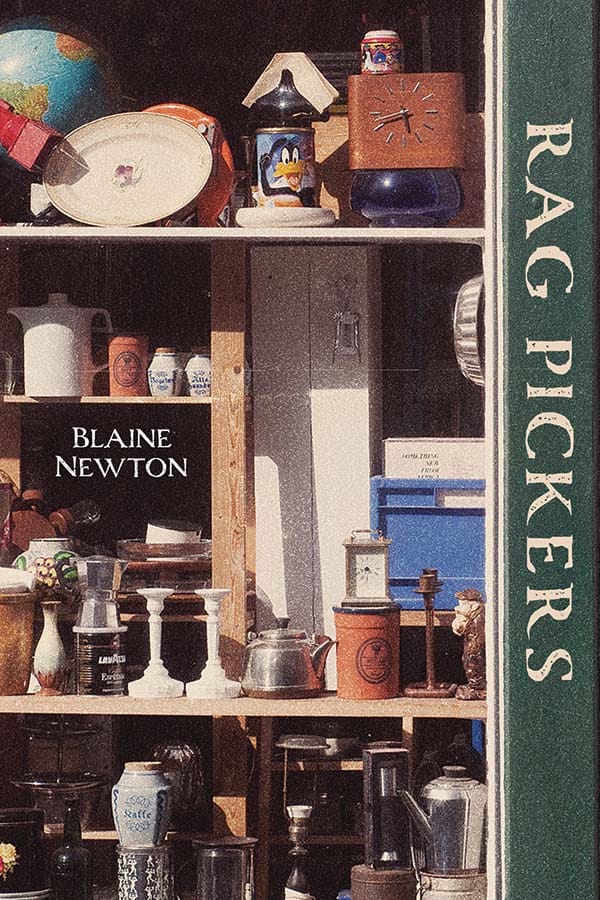Rag Pickers by Blaine Newton

Review by Kat Autiö | Infocalypse Press
Reading Rag Pickers feels like existential ASMR, humming somewhere between comfort and unease. The uncanny correspondences arrive quietly: a dying man burying jars of coins just to leave behind a pattern, a woman rearranging the stick figures on her minivan to redraw her life, an elevator opening on nothing at all. These small ruptures accumulate until the book begins to vibrate—not with plot, but with self-recognition. Praised by CBC for its wit and humanity, the collection also tunes into deeper frequencies: entropy, recurrence, and the quiet endurance of meaning after certainty falls away.
Newton writes about the people who keep living after meaning has evaporated: the mathematician tracing patterns in static, the woman reading a stranger’s anger sewn into her coat, the performer mouthing his act to the wind, the woman in the pasture talking to cows because they, at least, won’t interrupt. The work is often funny, sometimes bleakly so, but never cruel. These aren’t broken people; they’re temporal archaeologists, digging through the sediment of their own lives. Newton’s characters don’t transform—they loop. They repeat gestures that no longer save them but still keep them tethered. It’s existential, sure, but not grim. His world hums with grace and futility in perfect unison.
Newton’s prose has an engineer’s precision and a poet’s restraint. He doesn’t announce emotion; he builds the scaffolding and lets you feel the air around it. The sentences are beautifully aerodynamic, though sometimes that polish keeps the heart at arm’s length. When he loosens control, the stories breathe differently, like an engine finally idling into warmth.
In “A Limited Run”, a man’s death is rendered as surrender:
“He begins to claw ineffectually at the collar that is already open… when a noise quiets him… like rain on the horizon… covering him. Comforting him.” (p. 176)
It’s an exquisite image, but every choice is gentle, carefully anesthetized. Even claw loses its violence under all that calm. There’s no rupture—no harsh consonant or breathless syntax to let the moment wound. The diction is devotional rather than desperate. This distance is a deliberate choice, but it’s also where the prose could push harder, where one fractured word might make the stillness hurt.
By contrast, in “Conversations with Cows,” Newton lets the language bruise. When Kate fumbles with her lighter after revealing the truth:
“Kate tries again to light her cigarette… finally hurling the lighter past the fence… breaks it like a promise… the tiny shreds of tobacco spilled on the ground like entrails with no future to portend.” (p. 64)
The sentence is a masterclass in escalation. Hurling, broken, portend—each word lands with the weight of a small catastrophe. The verbs are muscular and cinematic, cracking through the scene like sparks refusing to catch. Even the image of the “broken checkmark” feels accusatory, a visual punctuation of failure.
Here, Newton’s language doesn’t just describe grief or anger; it performs it. The syntax unravels with Kate, the hard consonants striking like the flicks of that useless lighter. By the time the tobacco “spills like entrails,” the prose itself seems to bleed. In moments like this, Newton abandons observation for embodiment—the writing stops analyzing despair and starts to become it.
That oscillation between control and release shapes the collection as a whole. The stories speak to one another in recursive murmurs, replaying questions that don’t want answers. Newton isn’t chasing transformation; he’s tracing orbit. Read together, the book feels like déjà vu made tender. Nothing resolves, and yet everything lingers. You close it the way you wake from a long dream: disoriented, but with the sense that time doesn’t really move forward at all—it folds back on itself, quietly and stubbornly.
Rag Pickers is a book of echoes and small mercies, worn lightly and with a sly sense of humour. It suggests that repetition isn’t the end of meaning—it’s how meaning holds on.
Details:
Blaine Newton is an acclaimed playwright, comedy and short fiction writer, actor and sometime engineer. His plays have been produced across western Canada, and his short fiction has been published in magazines and anthologies, and featured on CBC and CKUA radio. He lives in Edmonton with his wife, Leslie Greentree. Rag Pickers is his first short story collection.
Publisher: University of Calgary Press (June 15, 2025)
Format: Paperback 9″ × 6″ | 190 pages
ISBN: 9781773856193
See also the CBC Books review of Rag Pickers , praised for its wit and haunting humanity.
Subscribe to my newsletter to get the latest updates and news
